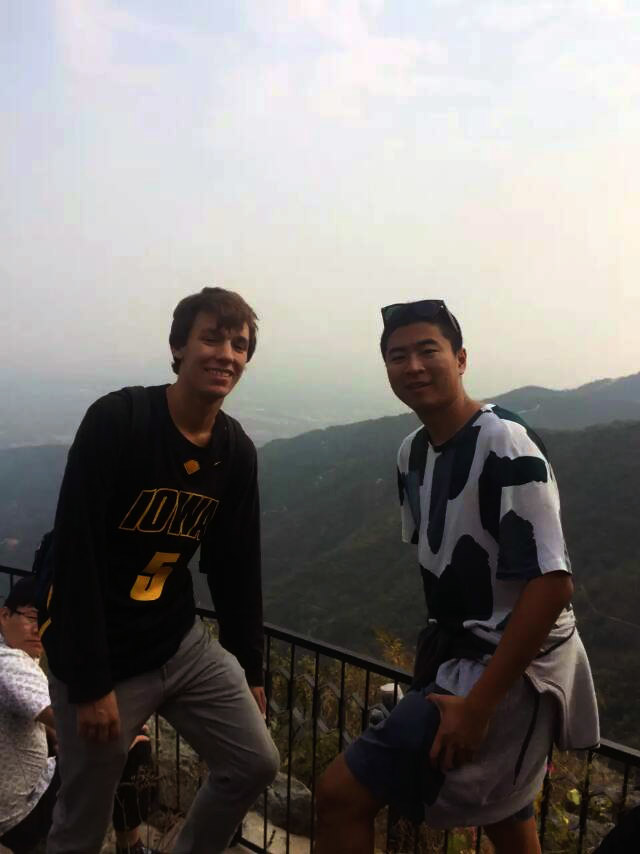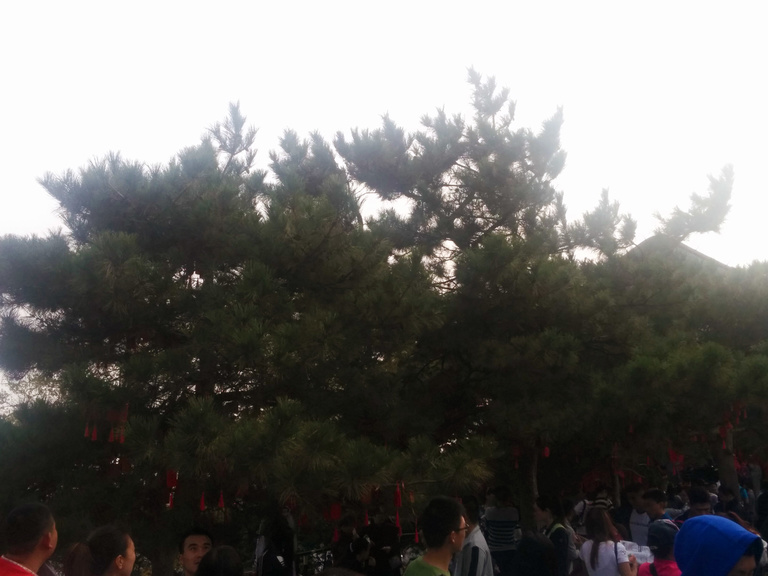By Jeffrey Ding*

Hawkeyes at Fragrant Hills
Beijing is vast. I’ve been here the span of seven Hawkeye football wins, and the city’s vastness is overwhelming at times. The vastness is geographical. At 6,000 square miles – larger than Connecticut – the city’s rings stretch outward into rural villages masquerading as suburbs.
Try taking the subway from the northwest corner of the city, where Peking University is located, to Yizhuan Culture Park, in the southeast corner; the bus or taxi through typical traffic will take even longer. The vastness is also historical. It reaches back through Mongol, Chinese, and Manchu dynasties, when the city was passed back and forth among occupiers.
Two weekends ago, CIEE organized a trip to the Peking Man Site at Zhoukoudian, and we learned the Beijing’s history boasts a length of 500,000 years, starting with Homo erectus remains found nearby. Of course the vastness is also anthropological. I don’t know if I used “anthropological” correctly in the previous sentence, but, put simply, there are a lot of people here.
Every time I eat in the school’s cafeteria for lunch, my number one priority is not to satisfy my hunger but rather to avoid spilling all my food while navigating the crowd. Many of my friends who are in the intensive language program have taken to a popular Chinese idiom, renshanrenhai, meaning huge mountains and seas of people.
This weekend, I met up with Devin, an old University of Iowa friend teaching English for the year in Beijing, to hike up the Fragrant Hills (xiangshan). The day before, the city’s AQI, an index for reporting daily air quality, had reached very hazardous levels. I had hoped that the excursion would serve as a much-needed escape from all the people, the pollution needed to feed the people’s consumption. I was searching for an escape from vastness, but in fact, I encountered it in all its forms on the mountain.
We woke up early, for a Saturday at least, and took a bus to the mountain. The Fragrant Hills are also located in the northwest sector of the city, but the transit still took over an hour. Near the base of the hills, we toured halls built during Emperor Qianlong’s reign (1700s), in the Qing Dynasty. Temples and terraces decorated our leisurely hike up, and we fascinated by the history of a park first built in 1186 in the Jin Dynasty. And of course, as a popular tourist destination known for the beautiful red leaves that appear in the fall, the Fragrant Hills attract thousands of tourists. As we wait in lines to hike up and down nature, I realize that Xiangshan is, literally, renshanrenhai. A mountain of people.
There is a vastness about China revealed in Beijing. Every Monday, our CIEE Beijing Study Center Director sends out an email highlighting interesting lectures taking place throughout the week. This Monday’s overview was overwhelmingly great. There is a lecture from a Harvard Emeritus Professor on demystifying the One-Child Policy, Jennifer Turner from the Woodrow Wilson Center’s China Environment Forum on water-energy-food chokepoints faced by China’s development, a former U.S. Secretary of Labor – the first American woman of Asian descent to be appointed to a President’s Cabinet – talking about U.S.-China educational exchanges, and the former chief of Morgan Stanley Asia presenting on China and the global economy. This doesn’t include events on Chinese cinema, Special Economic Zones, and global drug policy reform. So if I had a time machine or a teleportation device to avoid Beijing’s suffocating traffic, I would absorb all of it.

Wishes hanging on trees
Though I was born in the most populous city in the world (Shanghai, according to the concept of city proper), I have never lived longer than two months in a big city on my own. At times, I am gasping for breath here. When I see the sea of faces in the cafeteria, I’m often at a loss, thinking that the amount of purposeful relationships I build over the course of this semester will not surpass the number of people eating lunch in one of the eight cafeterias on campus. But sometimes, I breathe it all in.
At the top of the Fragrant Hills, the air’s AQI is perfect. People pay 10 RMB to write their aspirations in red ribbons and hang them on the beautiful trees. This is the appeal of big cities. Whether in China or in the United States, metropolises have their distinct textures but a universal appeal. People from all different backgrounds come to climb up mountains and still dream of higher heights.
*Jeffrey Ding is a senior from Iowa City, IA studying political science, economics and Chinese at the University of Iowa. He will be spending this fall in Beijing, China on the CIEE Advanced Chinese Studies program and will continue living there next semester as he pursues an internship funded by a Boren Scholarship.